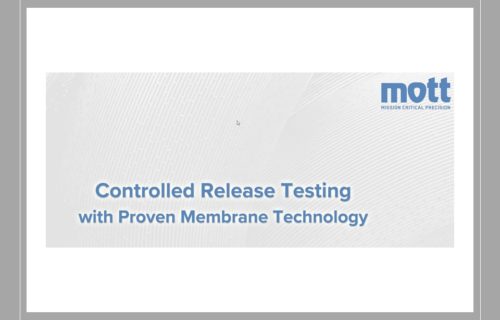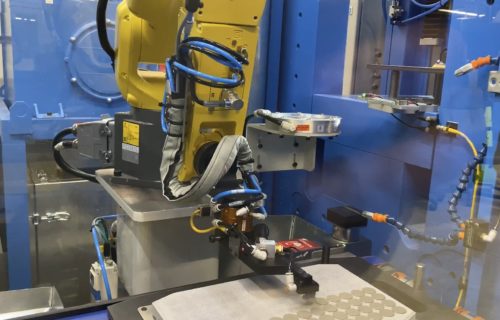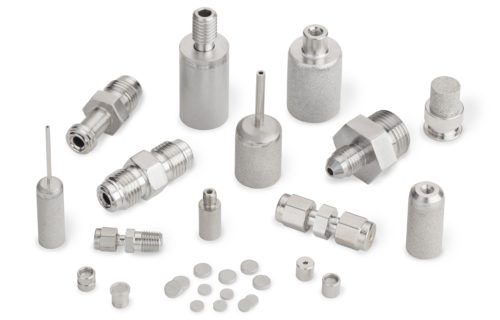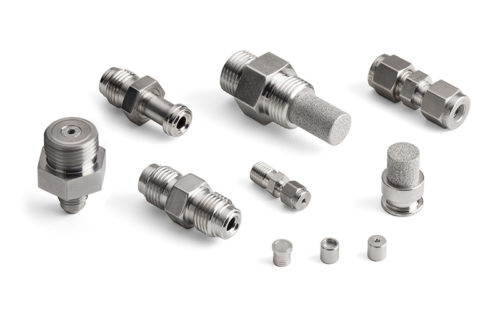Drug Diffusion Testing
Mott is equipped to conduct specialized drug diffusion testing and feasibility studies, aiding in the development of your next-generation, controlled-release drug delivery product. Leveraging established surrogate suspensions as a baseline for your unique compounds, our drug diffusion test provides a thorough assessment of drug diffusion rates. This offers critical early insight into the form, fit, and function of your device. By utilizing these drug diffusion tests, you can significantly shorten in vitro test times and narrow the scope of in vivo modeling, accelerating the process of bringing your innovative device to market.
Information Request
Literature & Data Sheets
Typical Applications
- Low-Flow Drug Delivery
- Implantable Sustained Release
- Catheter-Based Release
- Overdose Protection
Implantable Controlled-Release Drug Delivery Testing
Let Mott conduct your initial drug diffusion feasibility studies to guide the design criteria for your next-generation controlled-release drug delivery technology.
Lab and Engineering Services
Dealing with a complex, critical application? Rely on our engineers and scientists to solve your challenge.
Controlled-Release Drug Diffusion Tech Brief
Mott's controlled-release drug diffusion studies reduce in vitro test time by more than 90%.
Low-Flow Drug Delivery
Mott can customize delivery devices to meet specific requirements to manage extremely low flows for the release of therapeutic agents to optimize patient outcomes.
Product Specs
| Drug Flow Rates |
We can customize passive diffusion membranes in a range of porosities and dimensions to meet drug delivery flow rate requirements and concentration over time. Therapeutic window can be maintained consistently for extended periods. |
|---|---|
| Flow Accuracy |
Achieve consistent zero-order drug release for extended periods at tight dose standard deviation. |
| Device Hardware |
Assemble your flow element into an array of hardware options. |
| Materials |
We employ biocompatible titanium and 316L stainless steel, which have been successfully proven for use in implanted devices. As always, custom alloys and materials are available upon request. |
Videos & Articles
Our Design Capabilities
- Customizable, ultra-small components used in implantable devices
- Integrated device concept manufacturing for proof-of-concept trials or transition to production
- Extensive partner network for new materials
Relevant Services
Drug Diffusion Testing: If you need data packages or flow feasibility testing for your molecule or device concept, we’d welcome the opportunity to work with you.
Computational Fluid Dynamics: If you would like to model your process fluids interaction with your Mott-requested part, ask your Mott representative how we can model it using CFD software.
Additive Manufacturing: Controlled porosity 3D printing make it possible to integrate hardware and drug flow elements using a single print.
Conducting Drug Diffusion Tests with Mott's Expertise
Mott’s specialized approach in conducting drug diffusion tests is a cornerstone in the development of advanced drug delivery systems. These tests are essential for determining the diffusion rates of medications, providing invaluable data for the design and functionality of controlled-release drug delivery products. By using drug diffusion tests, Mott ensures that each product not only meets stringent medical standards but also aligns with the specific therapeutic needs of patients. This rigorous testing process is a critical step in Mott’s commitment to enhancing drug delivery technologies.
FAQs: Drug Diffusion Testing
Q: What is a Drug Diffusion Test?
A: A drug diffusion test is a scientific method used to measure the rate at which a drug disperses or diffuses through a medium. This test is critical in the development of drug delivery systems to ensure controlled and consistent release of medications.
Q: Why are Drug Diffusion Tests important in drug delivery system development?
A: Drug diffusion tests provide essential data on how a drug releases and spreads in the body, which helps in designing effective and safe drug delivery devices. It ensures the product meets medical standards and patient needs.
Q: Can Drug Diffusion Tests predict drug behavior in humans?
A: While drug diffusion tests offer valuable insights into a drug’s release rate and pattern, they are typically conducted in controlled environments and may not fully replicate the complexities of the human body. Further clinical trials are necessary for comprehensive understanding.
Q: How does Mott utilize Drug Diffusion Tests?
A: Mott utilizes drug diffusion tests to assess and refine their drug delivery products, ensuring they provide controlled and precise medication release. This testing is a vital part of Mott’s process in developing innovative and effective drug delivery solutions.






